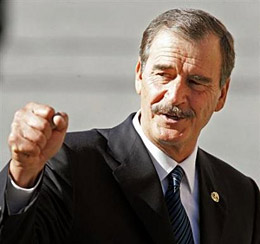 |
 |
 |
 Editorials | November 2005 Editorials | November 2005  
A Rancorous Primary Leaves 3-Way Race to Lead Mexico
 James C. Mckinley Jr. - NYTimes James C. Mckinley Jr. - NYTimes


| | A former Cabinet minister is seen as President Vicente Fox's favorite for the July 2006 elections. (Jose Manuel Ribeiro/Reuters) |
It was a bitter primary campaign, full of mudslinging, scandals and party schisms, the sort of political donnybrook seldom seen in Mexico. But as the last returns came in Monday from Sunday's final primary, voters were left with three candidates standing for president.

The next president will be chosen next summer from among the left-wing former mayor of Mexico City, a conservative former energy minister who has promised to crack down on crime and an old-fashioned political boss in the PRI party machine that ruled Mexico with no small amount of fraud and corruption for seven decades.

The biggest surprise is the former energy minister, Felipe Calderón, who trounced President Vicente Fox's favorite, Santiago Creel, the former interior minister, to become the standard-bearer for the conservative National Action Party.

Mr. Creel's pristine image was badly tarnished by news reports describing how, just before leaving office in May, he handed out lucrative gambling permits to companies affiliated with the nation's dominant media company, Televisa, and to wealthy business executives who could help his campaign.

The accusation that he paid especially low rates for his television advertisements dogged him.

Mr. Calderón, 43, an aggressive, sharp-tongued politician, is running on a platform of cracking down on crime, sticking with a free-trade policy and providing more jobs.

The winner in a battle within the Institutional Revolutionary Party, or PRI, which ruled Mexico until 2000, is Roberto Madrazo, 53, a former governor of Tabasco Province and more recently the national chairman of the party. A tough campaigner, Mr. Madrazo has promised to provide competent leadership, setting himself up as the opposite of Mr. Fox, who is widely seen as an ineffective leader.

But Mr. Madrazo's victory did not come without cost. He drove out several opponents while engineering his success, and several top party leaders have either resigned in protest or called for him to step aside. His strongest opponent, Arturo Montiel, was forced to give up the race after news reports saying his family had made a fortune while he was governor of the state of Mexico.

The former mayor of Mexico City, Andrés Manuel López Obrador, 52, was the only candidate not to face any challenge within his party, the liberal Democratic Revolutionary Party. His rivals folded earlier this year after Mr. López Obrador successfully beat back attempts by the two other parties to torpedo his candidacy with a charge that he had ignored a court order.

His main pledge has been to expand public works projects and to provide free health care and cash subsidies to the elderly, as he did in the capital. He has painted his opponents as captives of the same network of big business leaders and machine politicians who held power here for most of the 20th century. Rejecting an expensive media campaign, he has promised a grass-roots movement to galvanize voters from the lower and middle classes, from which polls say his supporters come.

Indeed, he has been touring the country by car, giving speeches in every town along the route, like the old whistle-stop campaigns in the United States.

"I think what's needed is a true purification of public life, a sharp renovation, and this has to take place from below toward the top," he said in a recent interview on Televisa. "That's why I do these meetings, these encounters with the people."

But Mr. López Obrador has a messianic streak that some critics say indicates that he would be an authoritarian leader. In recent days, Mr. Calderón has tried to tap a deep uneasiness among middle- and upper-class Mexicans about Mr. López Obrador's brand of populism, a fear he would roll back free trade agreements and bankrupt the state with expensive social programs.

"He practices a very dangerous Manichaeism," Mr. Calderón said of Mr. López Obrador in a recent interview with Milenio magazine, "one in which the reading is: 'I am good and all the rest are bad.' It's like the old joke of the drunk who goes the wrong way on the highway and hears on the radio that some lunatic is going against the traffic. 'One?' he says. 'There are a thousand.' "

Mr. Madrazo, too, portrayed Mr. López Obrador on Monday as a closet dictator, comparing him to President Hugo Chávez of Venezuela. "They have very similar attitudes. I see authoritarianism in them both. they think they possess the absolute truth and are in permanent conflict with capital," Mr. Madrazo told a news conference for foreign journalists.

The fighting was just as rough in the three-way fight for the nomination in President Fox's party. Mr. Creel suffered from the betting parlor scandal. The militant rank and file of the party, who tend to be more conservative than Mr. Fox and his allies, also wanted to distance themselves from the president, who is widely seen in the party as an ineffective leader. | 
 | |
 |



